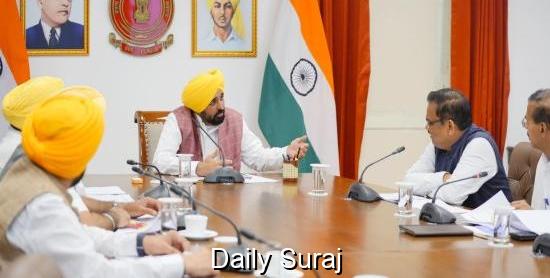State Cabinet Clears Punjab’s First Integrated Water Plan
- Punjab
- 20 Jun,2025

Chandigarh : Taking a historic step toward sustainable water management, Punjab Chief Minister Bhagwant Singh Mann has approved the state's first Integrated State Water Plan, which includes a comprehensive 14-point action strategy aimed at conserving, replenishing, and managing water resources across the state.
Chairing a meeting with the Water Resources Department, the Chief Minister highlighted the urgent need for intervention, noting that 115 of Punjab’s 153 blocks are overexploited in terms of groundwater extraction. “The plan aims to reduce groundwater dependence and promote the use of canal and surface water for irrigation and other needs,” he stated.
Mann expressed concern over the alarming annual drop in groundwater levels—currently averaging 0.7 metres—due to the extraction of 5.2 billion cubic metres of water annually. The action plan focuses on curbing groundwater demand, improving irrigation efficiency, artificial groundwater recharge, exploring deep aquifers, and promoting surface water use.
Highlights of the 14-Point Action Plan:
Water-Efficient Irrigation: The plan aims to bring over 15.7 lakh hectares under micro-irrigation techniques such as drip and sprinkler systems, reducing dependency on traditional, water-intensive methods.
Canal Infrastructure Restoration: A major push to revive old canal systems has already seen the restoration of 17,000 watercourses and 79 abandoned canals. The plan aims to further restore and expand surface water networks to ensure equitable distribution.
Surface Water Utilization: Excess canal water will be routed to nearby ponds, from where it will be lifted to agricultural fields using solar-powered pumps and lift irrigation systems.
Participatory Irrigation Management: Water User Associations will be established to manage local irrigation systems, ensuring transparency, canal cleanliness, and reduced water wastage.
Flood Management: The plan proposes floodplain zoning, modeling and mapping, and construction of check dams to store excess water from rivers like the Ghaggar. This stored water will be repurposed for agricultural use.
Groundwater Research: Emphasis will be placed on deep aquifer studies, basin-wise planning, and identification of aquifer characteristics to create sustainable, region-specific water strategies.
Recharge and Reuse: Check dams will divert water to existing ponds, where it will be treated using modern technologies such as nano-bubble systems and then reused for agriculture.
CSR Participation: The plan encourages private sector participation under Corporate Social Responsibility (CSR) initiatives for setting up sewage treatment plants, recharge structures, and promoting micro-irrigation.
Awareness and Education: Community outreach through schools, media, NGOs, and farmers' groups will focus on water conservation, sustainable usage, and the value of water.
Crop Diversification: The plan supports shifting away from water-intensive paddy cultivation to less water-demanding crops like maize, cotton, and basmati rice to reduce groundwater stress.
Chief Minister Mann stressed the importance of every drop of water and reiterated the government’s commitment to ensuring a sustainable water future for Punjab. “Water is life. This plan is not just a policy but a mission to protect the future of our state,” he said.
On this occasion, Cabinet Ministers Gurmeet Singh Khudian, Hardeep Singh Mundian, Tarunpreet Singh Sondh, and other officials were present.
#PunjabWaterPlan #WaterConservation #SustainableDevelopment #IntegratedWaterManagement #PunjabNews #GroundwaterCrisis #ClimateAction #WaterStrategy #WaterSecurity #GreenPunjab
Posted By:
 Daily Suraj Bureau
Daily Suraj Bureau

Leave a Reply